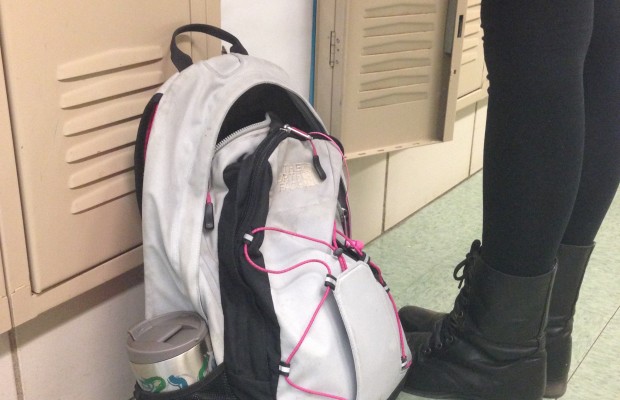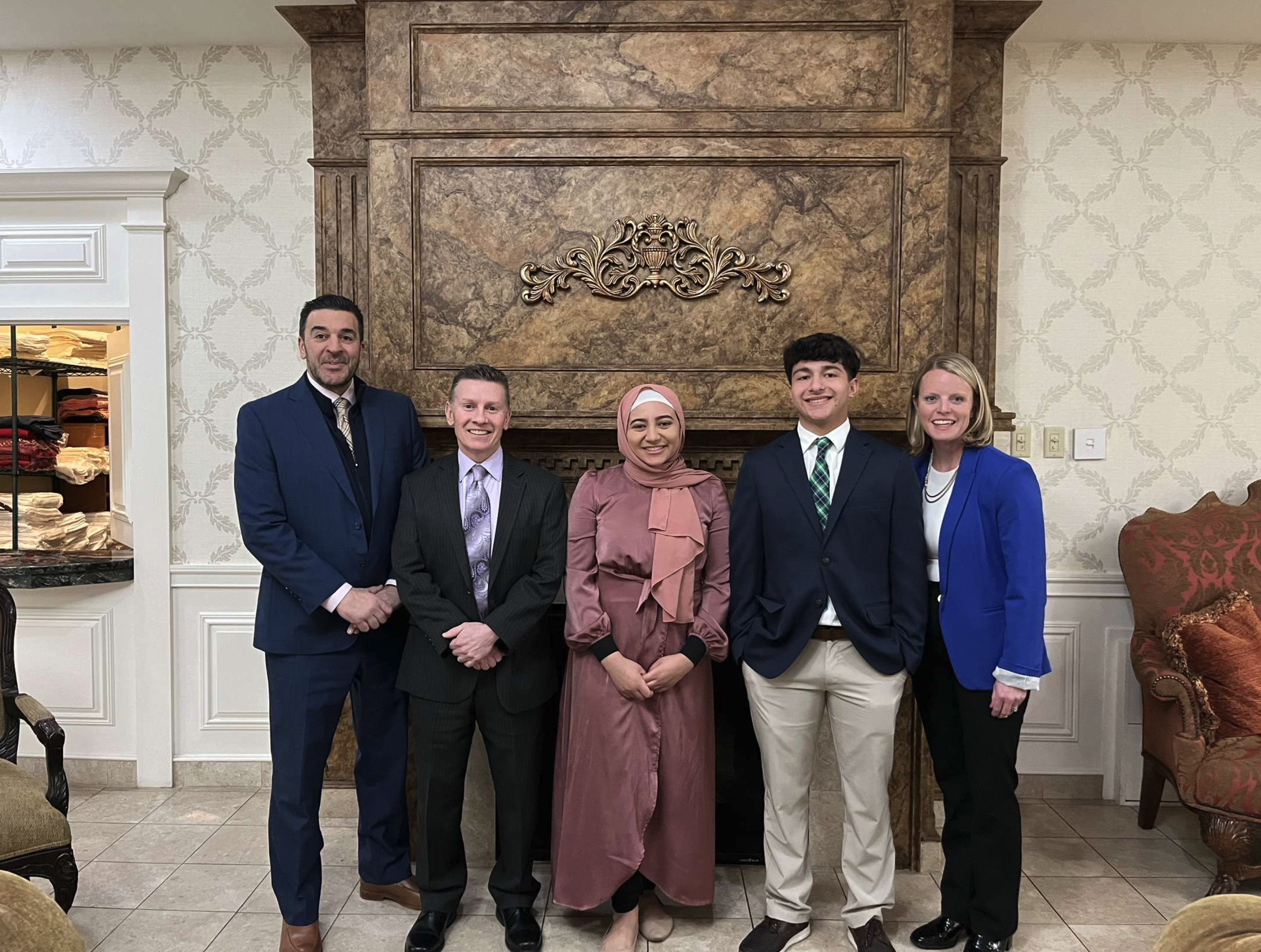By Katie Minutillo and Tina Vlamis
Woodland Regional High School was locked down on January 13, 2015 as six highly trained canines roamed the hallways searching for illicit drugs. The search was authorized by the Region #16 Board of Education “to eliminate the presence of illegal drugs and other contraband from its schools.”
The Board of Ed policy for “Use of Canine Sniffing for School Searched Property” had yet to be enforced or utilized in Region 16. Assistant Principal, Dr. Dana Mulligan,, noted that the search was approved but did not occur until this Tuesday.
“The Board of Ed did not approve the policy until March 28, 2012, so there could not have been a canine search prior to that,” said Mulligan.
All that changed this year when newly appointed Superintendent Michael Yamin requested a school-wide property search in September 2014. Due to scheduling and availability of police dogs, the search was put off until early 2015 when it was finally organized by State Police Officer Sergeant Brent Aiken.
The school was placed in modified lockdown. Teachers locked doors and restricted passes, but while the dogs roamed the hallways, classes continued. Students were not permitted into the hallways while the dogs were searching. The canines, trained to hit on illegal substances, sniffed Woodland’s approximately 700 lockers and 400 cars in less than an hour.
When a dog alerted on a locker or an automobile, an administrator searched to find what caused the dog’s alarm. Woodland Principal, Kurt Ogren, noted that these dogs are “very impressive.”
“[An alert] means drugs either are in the vehicle or at one point were in the vehicle,” noted Ogren. “It could be an innocent student who gave someone a ride who had drugs in their pocket or the smell [of drugs] on their clothes.”
[su_pullquote]
“I think that the police and canines had every right to come.”
– Nicole Cina
[/su_pullquote]The search process was simple: if the canine hit on a locker, an administrator would open it and search the locker’s contents; however, if a canine smelled something in a car, the driver of the car was called out of class and asked to open the vehicle so the search team could search of the interior of the car.
“The police say there is no such thing as a false positive,” said Ogren. “If a dog hit on a vehicle, and we didn’t find anything, we still did call the parents of those students.”
As this was the first canine sniffing search to occur at Woodland, students were initially confused about the extent and legality of the search. Rumors and vague details were spread through word-of-mouth and the student body formed mixed opinions. Some students, such as senior, Nicole Cina, viewed it as fair.
“I think that the police and canines had every right to come,” said Cina. “If students are bringing illegal things on school’s private property, they should get in trouble for it.”
However, there were students who believed the search was unjustified and even breached their rights as students. Senior Pat Hale believed the search was wrong.
“It is an invasion of privacy for the student,” said Hale. “If they want to drive their car to school they should have the privacy of their car.”[su_pullquote align=”right”]
“It is an invasion of privacy for the student.”
– Pat Hale
[/su_pullquote]
While opinions on what constitutes “reasonable expectation of privacy” may be blurred, concrete rules about privacy apply to every student of Woodland when they enter school property.
Region #16 BOE policy #5145.122 states that during canine dog searches “all lockers, desks and other storage places on school property as well as vehicles parked on school property are subject to search by school officials whenever there are reasonable grounds to believe that a search would produce evidence of illegal activity or a violation of Board policy or school rules.”
Students caught with illegal substances in their lockers or cars–whether the substances belong to them or not–will face consequences. For this reason, Ogren cautions students against sharing lockers.
According to the Region #16 Parent-Student Handbook, search and seizure on school grounds are in accordance with Fourth Amendment Rights. The Fourth Amendment, according to constitutioncenter.org, says that the rights of the people will be protected from unreasonable searches and seizures.
In the case of a canine sniff search at a school, searching the lockers and cars does not require “probable cause” because administrators have the right to inspect lockers and desks if there is “reason to believe that the student’s desk or locker contains contraband material” while in school.
Ogren recognizes this misconception of the need for probable cause and the misinterpretation of Fourth Amendment Rights in relation to a school.
“The police did not do any searches besides the sniff search. Administrators did the search. School administrators just need to have reasonable suspicion,” said Ogren. “Out of 400 cars, why did the dogs alert on those 3 cars? That is cause enough for reasonable suspicion.”
Ogren stressed that, when searching students’ cars, the intent was not to single out any particular student or students.
“We were certainly not looking to get anyone in trouble,” said Ogren. “It was definitely not a ‘gotcha’ moment.”
Region 16 students are expected to understand that possessing illegal substances anywhere on school property, whether stored in a personal vehicle or not, will result in consequences. The Parent-Student Handbook clearly states that: “Students shall not carry, smoke, or use tobacco products in any school building or school vehicle at any time, or on school property.” It even goes on to list the consequences if these rules are violated:
- the police will be notified,
- his/her parents/guardians will be contacted,
- he or she will be suspended from school,
- referred to a student assistance team, and
- considered for expulsion.
The consequences for infractions are even more clearly delineated in the Woodland Student Athlete Handbook. Specific punishments are listed for athletes caught violating school policy. For violating Woodland’s Alcohol and Illegal Drug Policy upon first offense, the student will be suspended for a “minimum of 20% of the season’s contests.” Depending on the “severity of the incident” a student may be suspended for the season and even for the remaining school year.
In order to avoid these consequences, students should understand these regulations and expect further searches periodically. This search was conducted for the safety of the students in the building and to enforce the Region’s “no drug” policy.
The Region #16 Board of Education believes the possession of any illegal substances on school grounds “to be highly detrimental to the learning process as well as the health and safety of students and staff,” and that concern was clarified and stated in a letter sent to all parents.
“We take no pride or pleasure in arresting students but we do want the message to be clearly communicated that we will not tolerate drugs in our schools,” said Superintendent Yamin. “It is our moral and ethical responsibility to keep the highest of standards.”
Even though calling for a drug search might be a tough decision, Ogren agrees that it is a crucial factor in ensuring that every student is able to learn in a safe and secure environment. And in this endeavor, further searches will be conducted.
“It’s 100% about safety. There are 830 people in this building every day,” said Ogren. “My number one job is the safety of everyone.”



















